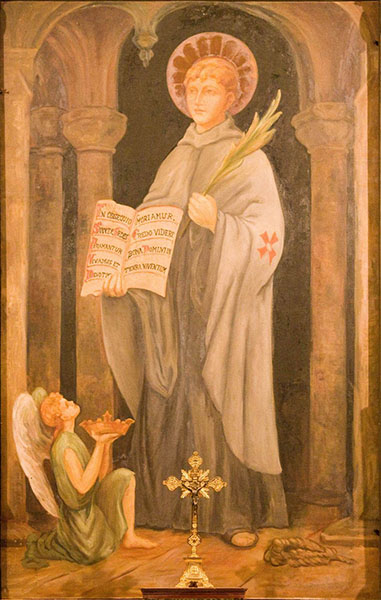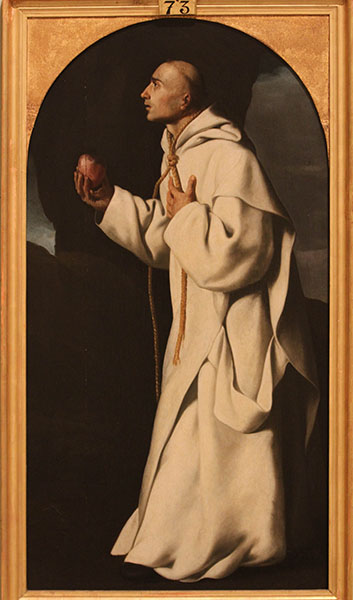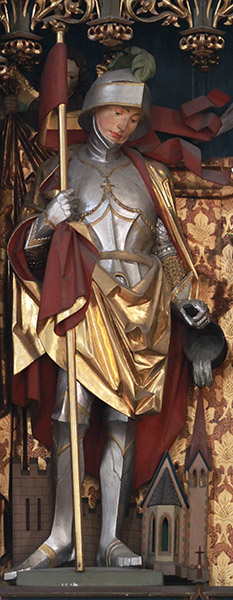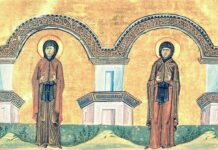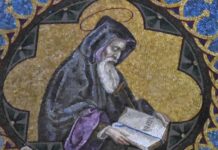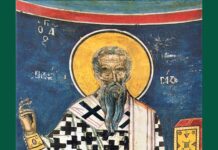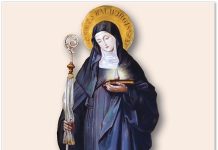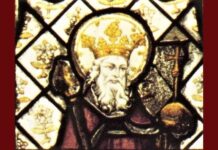Tuesday of the Fifth Week of Easter
Featured Saints

Blessed Marie-Leonie Paradis, virgin (†1912). Optional Memorial in Canada. She founded the Congregation of the Little Sisters of the Holy Family in Canada, to serve the clergy through the domestic care of rectories, seminaries and colleges.
St. Sylvanus of Gaza, bishop, and companions, martyrs (†circa 304). He was condemned to forced labour and finally beheaded in the mines of Phoenon, Palestine, with 39 other Christians, by order of Emperor Maximinus Daia.
Sts. John Houghton, Robert Lawrence, Augustine Webster and Richard Reynolds, priests and martyrs (†1535). Feast in England. The first men to die as martyrs during the reign of king Henry VIII for refusing to take the Oath of Supremacy. The first three were the first from the Carthusian Order and the fourth was a Brigidine monk.
St. Florian, martyr (†304). Roman soldier condemned for being Christian during the persecution of Diocletian; he was cast into the Enns River in Lorch, Germany, with a stone around his neck.
St. Antonina, martyr (†third/ fourth century). She was imprisoned for two years, tortured, and finally burned at the stake in Nicea for refusing to renounce the Faith.
Blessed Ladislaus of Gielnow, priest (†1505). Franciscan religious from Warsaw, he preached the Passion of Our Lord with extraordinary zeal, and composed hymns.
Blessed Jean-Martin Moÿe, priest (†1793). Priest from the Foreign Missions, founded the Institute of Sisters of Divine Providence in France, and went on mission to China. He died in exile in Germany during the French Revolution.
Mass Readings
First Reading – Acts 14:19-28
In those days, some Jews from Antioch and Iconium arrived and won over the crowds. They stoned Paul and dragged him out of the city, supposing that he was dead. But when the disciples gathered around him, he got up and entered the city. On the following day he left with Barnabas for Derbe.
After they had proclaimed the good news to that city and made a considerable number of disciples, they returned to Lystra and to Iconium and to Antioch. They strengthened the spirits of the disciples and exhorted them to persevere in the faith, saying, “It is necessary for us to undergo many hardships to enter the Kingdom of God.” They appointed presbyters for them in each Church and, with prayer and fasting, commended them to the Lord in whom they had put their faith. Then they traveled through Pisidia and reached Pamphylia. After proclaiming the word at Perga they went down to Attalia. From there they sailed to Antioch, where they had been commended to the grace of God for the work they had now accomplished. And when they arrived, they called the Church together and reported what God had done with them and how he had opened the door of faith to the Gentiles. Then they spent no little time with the disciples.
Responsorial Psalm – Ps 1145:10-11, 12-13ab, 21 (R. cf.12)
R. Your friends make known, O Lord, the glorious splendor of your kingdom.
or:
R. Alleluia.
Let all your works give you thanks, O LORD,
and let your faithful ones bless you.
Let them discourse of the glory of your kingdom
and speak of your might. R.
Making known to men your might
and the glorious splendor of your kingdom.
Your kingdom is a kingdom for all ages,
and your dominion endures through all generations. R.
May my mouth speak the praise of the LORD,
and may all flesh bless his holy name forever and ever. R.
Gospel – Jn 14:27-31a
Jesus said to his disciples:
“Peace I leave with you; my peace I give to you.
Not as the world gives do I give it to you.
Do not let your hearts be troubled or afraid.
You heard me tell you,
‘I am going away and I will come back to you.’
If you loved Me,
you would rejoice that I am going to the Father;
for the Father is greater than I.
And now I have told you this before it happens,
so that when it happens you may believe.
I will no longer speak much with you,
for the ruler of the world is coming.
He has no power over Me,
but the world must know that I love the Father
and that I do just as the Father has commanded Me.”


